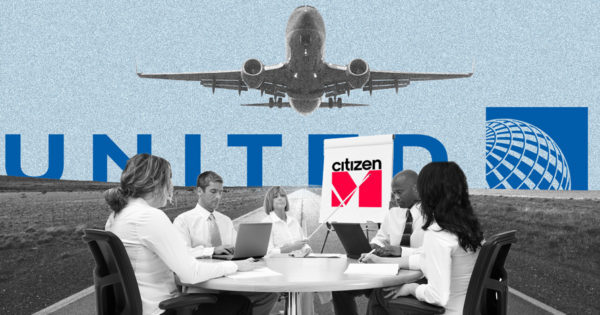
As the global aviation industry begins to take flight again, U.S. airlines are starting to get creative about keeping their most valuable flyers: business travelers.
U.S. airlines, on average, are looking to replace roughly 86.5% of their revenue from 2019. United Airlines’ revenue is down 85% so far this year.
Now, United, the nation’s third-largest carrier, is partnering with meeting and event space company Peerspace, to bundle flights alongside office space. The airline is homing in on professionals whose jobs are again requiring long-distance travel.
“We’re an airline; we’re not in the office space business or the meeting space business. But how can we solve that problem of having people come together safely?” said BJ Youngerman, who leads United’s California market strategy. “Regardless of where someone may be living on a temporary or permanent basis, we have the ability to bring people together.”
Peerspace’s platform touts nearly 20,000 spaces in more than 1,800 cities many of which are located near United hubs.
Youngerman said the idea was first discussed in April but not formally put together until now. Packages start at $5,000 and include a roundtrip flight and a short-term work area or a “unique collaborative” space for small gatherings.
In 2019, business travelers and their employers contributed $1.5 trillion to the global economy, according to the Global Business Travel Association, with more than 60% of travelers staying at an “upscale or higher” property. In a typical year, business travelers represent 75% of an airline’s profits.
Airlines aren’t alone in their dependence on corporate travelers. According to hotel industry analyst STR, group occupancy of more than 10 people is at roughly 4.7%, down more than 80% from a year ago. Marriott’s corporate travel is down 79%, and Hilton hasn’t fared any better.
During a recent earnings call, Hilton CEO Christopher Nassetta pitched an idea to convert unused rooms into offices for meetings or short-term use by college students.
“We are looking at every opportunity towards how we utilize all of our rooms and public spaces in creative ways in order to supplement and find pockets of demand,” Nassetta said. “Sell them as offices. Sell them as dormitories. All that flows towards room revenue.”
On Tuesday, Hilton announced a pilot program in the U.S. and the U.K. called WorkSpaces by Hilton which provides a room, a desk and Wi-Fi on a day rate. Marriott is expected to launch a similar program soon.
In late September, luxury international hotel brand CitizenM created a subscription service for business travelers, aiming to become the “Netflix of the hotel industry.”
For $600 a month, guests are allowed full access to CitizenM’s work-share spaces, meeting rooms and amenities, and can sleep there for three nights. There’s also a $1,500 offer, called the Global Passport, which allows for 30 days in any CitizenM hotel so long as guests stay a minimum of seven nights at the current room rate.
“This concept of how you set up your workforce post pandemic is a very hot topic amongst executives right now,” said Ernest Lee, citizenM’s managing director. “Remote work, hybrid-remote work will grow exponentially post-pandemic. There are still going to be areas where in person is superior to video conferencing. We want to serve as that in-person connection for these teams.”
While the plan was inspired by the pandemic—Lee described CitizenM’s occupancy rates as “not well”—it’s part of the brand’s long-term business strategy.
Already, there’s interest. Although he declined to name the specific brands, Lee said CitizenM is in talks with several “blue chip” companies in addition to several startups.
https://www.adweek.com/brand-marketing/airlines-hotels-workspaces-get-creative-in-effort-to-buoy-business-travel/

